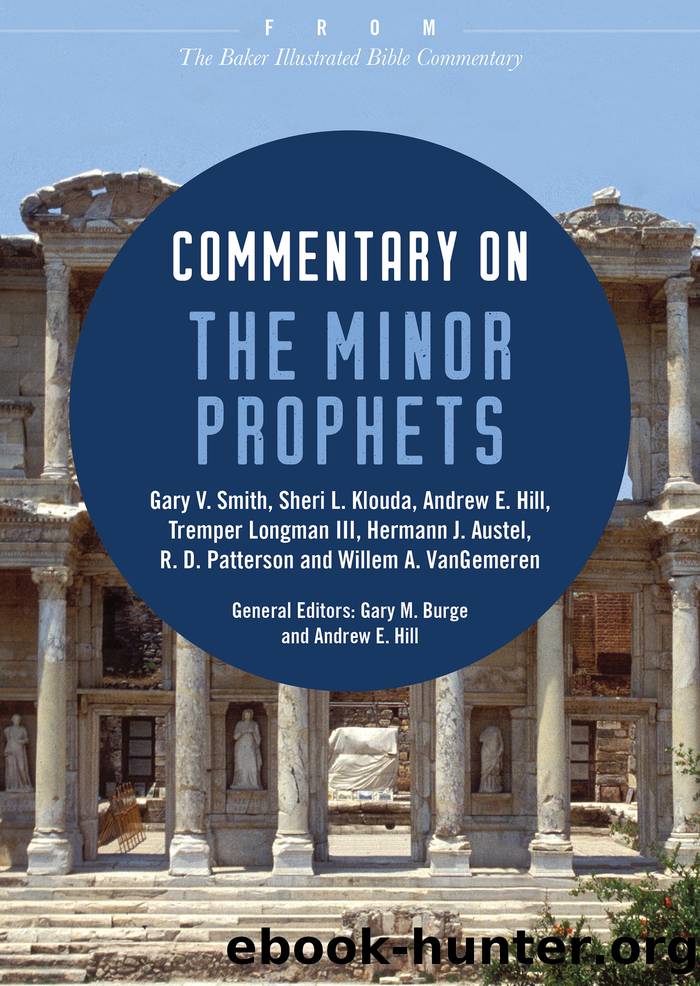Commentary on the Minor Prophets by Gary V. Smith

Author:Gary V. Smith [Burge, Gary M. and Andrew E. Hill]
Language: eng
Format: epub
Tags: Bible Commentary/Old Testament, REL006050, REL006060
ISBN: 9781493424627
Publisher: Baker Publishing Group
Published: 2019-10-24T00:00:00+00:00
Remains of Ahabâs palace in Samaria. Micah prophecies the downfall of those who follow âall the practices of Ahabâs houseâ (6:16).
B. Godâs reproach for Israelâs social sins (6:9â16). God once again pronounces judgment on his people. Micah calls the peopleâs attention to the Lord (âListen!â [6:9]). He adds a parenthetical comment directed to God that sounds familiar to those who know the book of Proverbs: to fear Godâs name is wisdom (Prov. 1:7; 9:10). As the people will soon learn, the opposite holds true as well; to treat God wrongly or indifferently is foolish and extremely dangerous.
God then addresses the people of the city (most likely Jerusalem) and forcefully informs them that he is well aware of their sins, specifically social oppression. They cheat and lie in order to prosper in business. They grow rich at the expense of others.
God will not permit this state of affairs to continue, so he will punish them. The punishment, once again, focuses on the nature of their sin. They cheated (by fraudulent business practices; compare Prov. 11:1; 16:11; 20:23; see also Lev. 19:35, 36; Deut. 25:13â16; Ezek. 45:10) in order to get rich and live a comfortable life. The Lord tells them, however, that they will be anything but comfortable. The Lord had blessed Israel with much material prosperity while they were faithful to him. At the time of the conquest, God told them that they would have cities, houses, vineyards, and olive groves that they did not build or plant (Deut. 6:10â12). Now that they are disobedient, however, God tells them that no matter how much work they do, they will have no material prosperity.
The last verse of this section summarizes both the reason for punishment and the nature of that punishment. Israel has sinned by following Omri and Ahab. These kings were known for their importation of the worship of Baal into the northern kingdom. Furthermore, Ahab was renowned for his own evil business practices. Since they go in the way of Ahab rather than in the way of justice, mercy, and humility, they will be destroyed.
C. The prophet laments Israelâs condition (7:1â7). Micah continues with a lament. He mourns the spiritual condition of his people. This section may be profitably compared with the many laments found in the book of Psalms. Two general types of laments are encountered in the Scriptures, individual and corporate. Though the latter are occasionally written in the first-person singular, the lament found in Micah 7 is best taken as an example of an individual lament, that is, as the prophet Micahâs mournful cry.
Micah paints a dark picture of contemporary society. No one is left who desires to follow God. The only thing the people do well is evil. Micah is exceedingly distressed and likens his own reaction to that of a man who craves grapes and figs but arrives too late in the field to get any. In short, he is bitterly disappointed and frustrated. Even the most promising of his contemporaries are quite bad.
The sins of the people have caught up with them.
Download
This site does not store any files on its server. We only index and link to content provided by other sites. Please contact the content providers to delete copyright contents if any and email us, we'll remove relevant links or contents immediately.
Fangirl by Rainbow Rowell(9215)
How to Bang a Billionaire by Alexis Hall(8128)
Wonder by R. J. Palacio(8087)
The Space Between by Michelle L. Teichman(6913)
The Thirst by Nesbo Jo(6910)
Assassin’s Fate by Robin Hobb(6188)
Wiseguy by Nicholas Pileggi(5751)
The Night Circus by Erin Morgenstern(5202)
Paper Towns by Green John(5164)
The Kite Runner by Khaled Hosseini(5155)
Bittersweet (True North #1) by Sarina Bowen(4830)
Gerald's Game by Stephen King(4625)
Too Much and Not the Mood by Durga Chew-Bose(4320)
Pillow Thoughts by Courtney Peppernell(4262)
Goodbye Paradise(3790)
Twelve Days of Christmas by Debbie Macomber(3546)
Good by S. Walden(3535)
The Rosie Effect by Graeme Simsion(3445)
The Cellar by Natasha Preston(3316)
